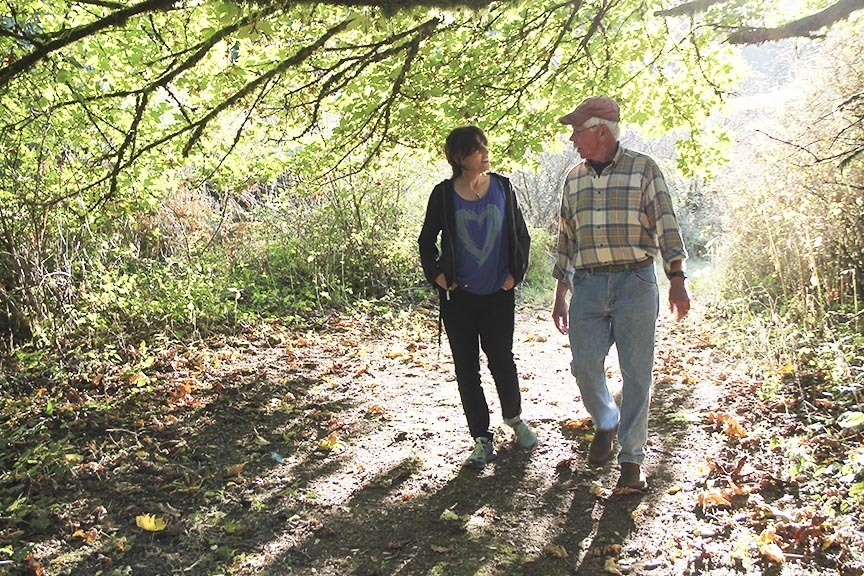One late afternoon last month, while the spun-gold of autumn’s fading light filtered through the madrona trees, a Los Angeles-based film crew gathered at the home of Phil Volker on Wax Orchard Road. The location, worthy of starring in a film, set the scene for a joyous reunion of the director, crew, cast and friends of the award-winning documentary, “Phil’s Camino,” on the eve of the film’s presentation at the Port Townsend Film Festival.
Laughter rose up from fields adjacent to the house, where Volker showed the crew how to pick ripe corn for the evening’s meal. Like the golden light, a warm glow of camaraderie infused the air. Two years ago, Director Annie O’Neil, Volker and the crew had not yet met nor could have guessed the surprising ways the film would unfold — all part of a greater backstory that began with one man’s cancer diagnosis.
Volker, 68, steps out of the garden, arms loaded with corn and a bright smile on his face. He exudes peace and a sparkling openness, a far cry from the image of a man living, for the past five years, with stage IV colon cancer. Volker’s inspiring journey of transformation — from his diagnosis to where he is today — is revealed in O’Neil’s film through rich visual images unaccompanied by narration.
“His determined character, life of simplicity and joy in the everyday,” she writes on philscamino.com, “presents a story of what it means to live vibrantly in the face of adversity.”
The short documentary is sweeping awards on the film festival circuit, winning 10 of 15 festivals, and has been submitted to the Academy of Motion Picture Arts and Sciences for an Oscar nomination.
Corn picked, the crew heads out to walk Phil’s Camino, a well-worn path that traverses pastures, meanders under a canopy of mature big-leaf maples and across a dry stream bed on Volker’s 10 acres. One lap measures .88 kilometers. The 909 laps Volker completed equal the 500-mile El Camino de Santiago, a famous Christian pilgrimage across Spain.
Volker learned of the Camino through a video, shortly after his diagnosis, and felt inspired to build his own.
“Little did I know I was following a template that’s been going on for years,” he said. “People have constructed models that represent far-away things to get some idea of what it would be like to take a pilgrimage. So, here I am doing the same thing, because I didn’t know I was going to Spain. I was just trying to have the experience here.”
That first step toward creating the Camino was the beginning of a cancer journey that Volker’s wife, Rebecca Graves, describes as “pretty amazing.”
“It’s been a demonstration of how things manifest,” she said. “He visualized it, and things just started to happen. Seemingly random connections grew. It was like cell division.”
First, Volker’s physical therapist suggested he and Graves watch “Walking the Camino: Six Ways to Santiago,” which just happened to be at the Seattle International Film Festival. As co-producer, and one of the six pilgrims interviewed for the film, O’Neil grabbed the couple’s hearts. Graves sent O’Neil a Facebook message telling her about Phil’s Camino. Volker followed with, “You are an inspiration, come walk with me.”
“I couldn’t turn it down,” O’Neil said. “My husband was speaking at a conference in Vancouver in a couple of weeks. We’d made plans a year earlier to fly into Seattle to see friends, leaving one day open for whatever might come up.”
What came up was a trip to Vashon, a lap around Phil’s Camino, deep bonds of friendship and O’Neil’s decision to make the film.
“This is the kind of thing I’m talking about,” Graves said. “Just like cell division. You could not have planned it, so that’s a pretty powerful message: If you can dream it, it can happen.”
In 2014, Volker realized his dream. After walking himself back to physical strength, he received the green light from his doctors for a chemo-holiday. He flew to Spain with fellow islander Kelly Burke to begin his 21-day pilgrimage.
O’Neil, who had been filming on Vashon and at Volker’s Seattle cancer treatment center, followed, ready to capture Volker’s pilgrimage in the new setting.
“What a great contrast it was visually between Vashon and the sun-drenched countryside of Spain,” she said, adding with a laugh, “‘Moody paradise’ — that was our word for Vashon.”
Since El Camino, Volker has attended film festivals with O’Neil and continues to tread his own camino. He’s shared it with several hundred people, especially those dealing with cancer. Between walking El Camino in Spain and Phil’s Camino on Vashon, Volker said he’s learned there’s a difference between being cured and being healed.
“I’m not in remission. I have stage IV cancer,” he said. “Cured is being over your disease. Healing is about reconciliation with God, your family, the bigger picture. You have to go beyond and have a full, rich life. There are lots of blessings, and you can’t keep stuff to yourself, you’ve got to let it go.”
Looking at the smiling faces around Volker and Graves’ picnic table piled high with steaming platters of corn, and hearing the easy hum of conversations, the richness of Volker’s life is not hard to miss. O’Neil taps her glass to quiet the crowd, announcing she’s just received a text from the Port Townsend Film Festival.
“Apparently, they do something special for their volunteers every year,” she said. “This year — tonight — they are showing them ‘Phil’s Camino.'”
Amid the cheers and clapping, a single voice added in conclusion, “Might I say, they have great taste.”


